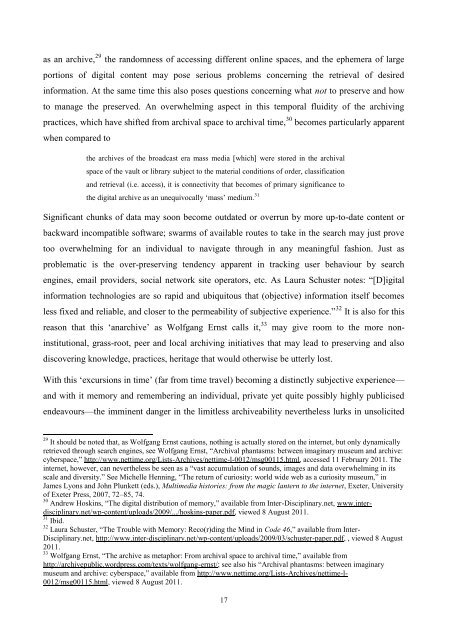UNIVERSITY OF NOVA GORICA GRADUATE SCHOOL ...
UNIVERSITY OF NOVA GORICA GRADUATE SCHOOL ...
UNIVERSITY OF NOVA GORICA GRADUATE SCHOOL ...
You also want an ePaper? Increase the reach of your titles
YUMPU automatically turns print PDFs into web optimized ePapers that Google loves.
as an archive, 29 the randomness of accessing different online spaces, and the ephemera of large<br />
portions of digital content may pose serious problems concerning the retrieval of desired<br />
information. At the same time this also poses questions concerning what not to preserve and how<br />
to manage the preserved. An overwhelming aspect in this temporal fluidity of the archiving<br />
practices, which have shifted from archival space to archival time, 30 becomes particularly apparent<br />
when compared to<br />
the archives of the broadcast era mass media [which] were stored in the archival<br />
space of the vault or library subject to the material conditions of order, classification<br />
and retrieval (i.e. access), it is connectivity that becomes of primary significance to<br />
the digital archive as an unequivocally ‗mass‘ medium. 31<br />
Significant chunks of data may soon become outdated or overrun by more up-to-date content or<br />
backward incompatible software; swarms of available routes to take in the search may just prove<br />
too overwhelming for an individual to navigate through in any meaningful fashion. Just as<br />
problematic is the over-preserving tendency apparent in tracking user behaviour by search<br />
engines, email providers, social network site operators, etc. As Laura Schuster notes: ―[D]igital<br />
information technologies are so rapid and ubiquitous that (objective) information itself becomes<br />
less fixed and reliable, and closer to the permeability of subjective experience.‖ 32 It is also for this<br />
reason that this ‗anarchive‘ as Wolfgang Ernst calls it, 33 may give room to the more noninstitutional,<br />
grass-root, peer and local archiving initiatives that may lead to preserving and also<br />
discovering knowledge, practices, heritage that would otherwise be utterly lost.<br />
With this ‗excursions in time‘ (far from time travel) becoming a distinctly subjective experience—<br />
and with it memory and remembering an individual, private yet quite possibly highly publicised<br />
endeavours—the imminent danger in the limitless archiveability nevertheless lurks in unsolicited<br />
29 It should be noted that, as Wolfgang Ernst cautions, nothing is actually stored on the internet, but only dynamically<br />
retrieved through search engines, see Wolfgang Ernst, ―Archival phantasms: between imaginary museum and archive:<br />
cyberspace,‖ http://www.nettime.org/Lists-Archives/nettime-l-0012/msg00115.html, accessed 11 February 2011. The<br />
internet, however, can nevertheless be seen as a ―vast accumulation of sounds, images and data overwhelming in its<br />
scale and diversity.‖ See Michelle Henning, ―The return of curiosity: world wide web as a curiosity museum,‖ in<br />
James Lyons and John Plunkett (eds.), Multimedia histories: from the magic lantern to the internet, Exeter, University<br />
of Exeter Press, 2007, 72–85, 74.<br />
30 Andrew Hoskins, ―The digital distribution of memory,‖ available from Inter-Disciplinary.net, www.interdisciplinary.net/wp-content/uploads/2009/.../hoskins-paper.pdf,<br />
viewed 8 August 2011.<br />
31 Ibid.<br />
32 Laura Schuster, ―The Trouble with Memory: Reco(r)ding the Mind in Code 46,‖ available from Inter-<br />
Disciplinary.net, http://www.inter-disciplinary.net/wp-content/uploads/2009/03/schuster-paper.pdf, , viewed 8 August<br />
2011.<br />
33 Wolfgang Ernst, ―The archive as metaphor: From archival space to archival time,‖ available from<br />
http://archivepublic.wordpress.com/texts/wolfgang-ernst/; see also his ―Archival phantasms: between imaginary<br />
museum and archive: cyberspace,‖ available from http://www.nettime.org/Lists-Archives/nettime-l-<br />
0012/msg00115.html, viewed 8 August 2011.<br />
17

















